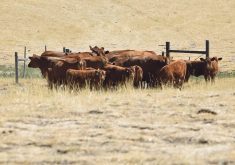Since the outbreak back in 2003, the concept of BSE testing as a marketing tool has been one of those exasperating “what if” scenarios. What if such BSE testing had been done from the beginning? Would export beef markets have been reopened a lot sooner? Would the billions in losses borne by cattle producers and the beef industry have been avoided?
It’s all hypothetical of course, until a recent study put the issue into perspective. The study was a long time in coming as many of the principal stakeholders such as government agencies, major beef processors, and industry groups were not keen in wanting the whole story to be told. For those who asked the obvious question about why BSE testing for marketing was not implemented, the study is a vindication, of sorts.
Read Also

Deep cuts to ag research jeopardize Canada’s farming future
The huge cuts to ag research at Agriculture Canada are being widely panned by farm organizations, but there seems to be little hope of the government reversing its decision.
The fact that the study was even made is a credit to the sponsoring agencies, the Alberta Livestock and Meat Agency, Prio-Net Canada and the Alberta Prion Research Institute. It was clear no government department or industry group was going to touch this highly politicized issue.
The study entitledA cost-benefit analysis of voluntary BSE testing in cattlewas done by the George Morris Centre. It’s a comprehensive report and goes beyond the title. It’s a review of the entire BSE issue, how it developed, its impact on marketing and how the industry was affected. It then ties in the BSE testing issue and how the various players reacted to the idea. Its somewhat surprising conclusion was that BSE testing for marketing does have some value in certain limited markets. That’s surprising since this is contrary to the position of the major beef processors. Its also contrary to the position of the Canadian Food Inspection Agency (CFIA) which has made it clear that it will oppose any consideration, or even thoughts, of BSE testing for marketing. Its position has always been that it must be based on sound science and not on any marketing schemes. The report questions that approach.
Perhaps only the George Morris Centre could have made such a fearless conclusion. Anyone who has experience in reading these types of reports knows that the authors usually choose their words and interpretations carefully. It’s clear from this analysis that the villain in the whole BSE testing issue is the CFIA and its big brother the USDA. More than once the report states that the vehement opposition of those two agencies stifled almost any initiative save for a couple by two brave meat packers. Anecdotally, packers are reluctant to cross either government agency because they fear costly retaliation wielded through the agencies’ inspection powers at the plant level. Both agencies act as judge, jury and enforcer when it comes to meat-processing regulations. Packers are painfully aware of that reality.
In evaluating the CFIA position, the report notes that their rigid position on BSE testing and sound science is not consistent. According to the report, the CFIA is involved with organic, hormone-free, and GM content inspection and labelling, most of which are not science based, but are marketing initiatives. A curious double standard, surely.
The report has gone a long way in settling the testing issue, that being it is viable and feasible. The Europeans proved that it did work in defusing the issue in the consumers and media’s minds. McDonalds in Europe for instance advertised on its menus that its beef had been BSE tested.
It’s clear that the belligerent opposition of the CFIA and USDA to the initiative will see that it will never be allowed to even be considered. The USDA even beat back a legal challenge by an American packer to begin such testing. The sole Canadian packer who enquired about the possibility has since gone out of business under secretive circumstances. I would suggest that other processors and exporters got the message, intended or not.
It was always going to take a massive political effort by producer groups and the beef-processing industry to get BSE testing for marketing approved. There was a window for universal testing at the beginning of the BSE outbreak, but when the USDA reopened their border to Canadian beef after a couple of months that avenue was closed. I suspect some of that had to do with a side deal between the CFIA and USDA on BSE testing, and the rest is history.
There is one curious perspective to the whole issue, David Pope, the rancher/lawyer who has singlehandedly led a crusade for testing, made an interesting observation about CFIA intransigence. He has commented that were there a very large outbreak of BSE, the CFIA has contingency plans to initiate exactly what they have so determinedly fought since 2003, Yes, that would be BSE testing all Canadian beef to make sure markets remain open. I suggest there is a message in that quandary.
———
PerhapsonlytheGeorgeMorrisCentrecouldhavemadesuchafearlessconclusion.













